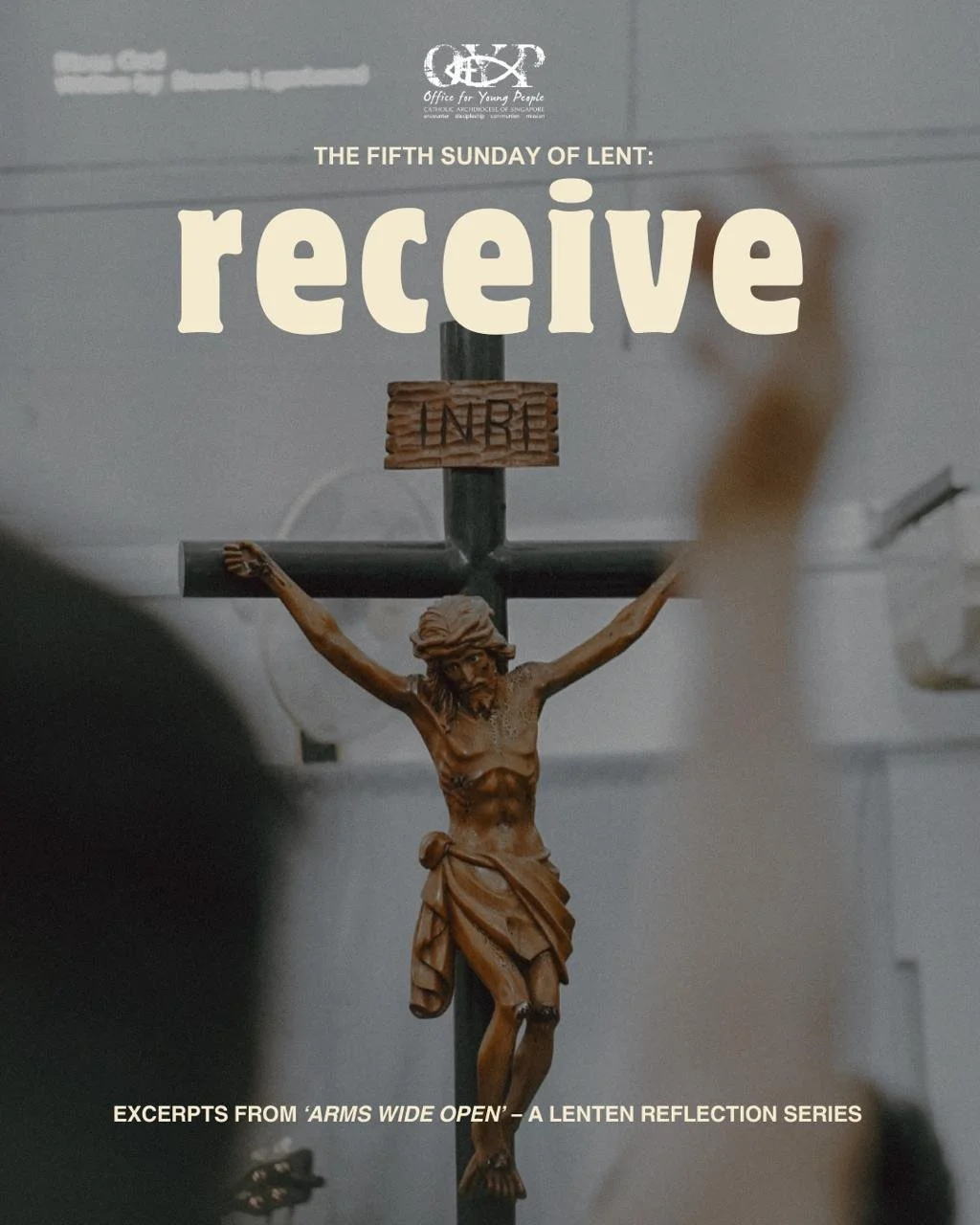The Fifth Sunday of Lent: Receive
Upon reflection, one phrase that I was particularly drawn to was ‘left alone’. As I imagined the scripture playing out, I thought of how uncomfortable and tense it must have been for the adulterous woman to stand before the Lord, and have her sin publicly called out. Even more so the anxiety she felt inwardly as she was left by herself with Jesus after everyone around her left the scene. Perhaps she also felt confused with what he was doing writing in the sand, when she expected harsh judgement or shaming for her actions.
In his podcast episode “What did Jesus write in the dirt?”Jeff Cavins described, in his own analysis of the events, that shame is useful in helping us stay on the narrow path. While he calls shame akin to a teacher, he also calls it akin to a terrible tyrant. The unpleasantness of shame is probably most intensified when the critical voices come from within ourselves. After all, it’s often said that, “we are our own worst critics’. Whether in my own faith journey or personal life, the struggle of dealing with my own inner critic is very real, and can often become a heavy burden.
In previous Lenten seasons, living in the spirit of conversion was already challenging, but choosing to continue the spirit after Lent was even more difficult. More often than not, the momentum would slowly be lost after Lent, and I would find myself sometimes slipping back into my former ways. Thoughts of ‘I should have become better by now’ or ‘why am I still like this?’ became a cyclical thorn within me, and even more so when I subconsciously compared myself to other peers who seemingly had more positive experiences in their own faith journey.
What I also find interesting in the scripture is the space of intimacy between the adulterous woman and Jesus when everyone else had left the scene. In that small moment, the woman is stripped of the accusations of everyone else, and stands face to face before the Lord. The jeers and distrustful eyes that wanted judgement on the woman are removed and there is only a moment of silence between the two. What I find thought provoking is that the final sentence Jesus gives to the woman, ‘Neither do I condemn you. Go, and do not sin again’ echoes the absolution given by the priest during the sacrament of reconciliation. In a way, that small brief moment was the adulterous woman’s experience of the sacrament.
Similarly, I am also invited to step away from the inner critic that discourages me from hope and into this same dwelling with the Lord in silence.There is no better starting point for this than in the Sacrament of Reconciliation - a space where I am called out of my unbelief and self-condemnation. Instead, I am called to walk humbly and courageously towards Jesus, to receive his grace and mercy so generously offered. Receiving this mercy enables me to pursue the Lord even when I have failed, as it reminds me that pursuing Christ is not a matter of clocking the most hours in deep prayer or achieving the most number of days without falling into temptation. It is instead an acknowledgment that even with my failings, they do not disqualify me from the Lord’s invitation of love. If I am truly convicted of the Lord’s mercy, then my smallest or most repetitive failings would not disqualify me from the Lord’s call for a repentant heart.
Like how Jesus did not condemn the adulterous woman, the Lord too does not wish for us to remain caught in our own shame. Instead, he desires to lift its yoke from our hearts. At this point of Lent, perhaps you might be feeling your efforts these past weeks have borne little fruit since Ash Wednesday. Maybe you might be feeling discouraged that with lent reaching its last days, you may not feel ready for Holy Week or Easter. Brothers & Sisters, let us take heart that Our Lord’s call for repentance does not end with Lent. He continues to call us to courage to take those steps to continual newness and conversion. He never tires, inviting us to step into silence with him and out of the shame we may carry heavily and perhaps, unknowingly. Will you enter this space with him each time?
Reflection questions & activity:
Reflect on your own experience with shame. In what ways has it been a teacher, and also a tyrant to you?
Imagine yourself as the adulterous woman alone with Jesus after everyone has left.
What is your reaction to the silence?
What would you like to share with Jesus in your own struggle with shame?
How do you desire to surrender your shame to Christ? What are the graces you need in order to do so? Write them down.
Invitation of the week
This week, find a time to go for Adoration, and spend it before the Blessed Sacrament in silence. Allow yourself to feel the presence of Jesus and his gaze.
If you have not yet gone for the sacrament of reconciliation, make time this week to go and receive God’s mercy!

